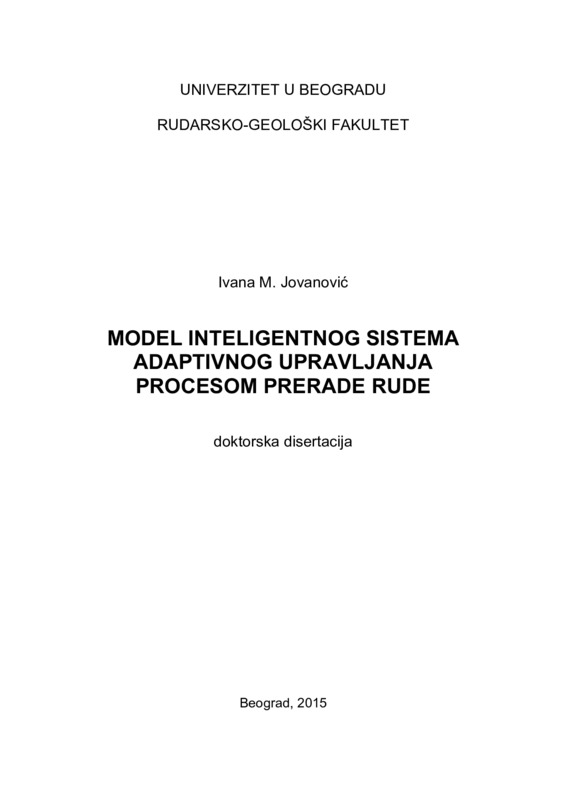Model inteligentnog sistema adaptivnog upravljanja procesom prerade rude
Објеката
- Ментор
- Igor Miljanović
- Члан комисије
- Ivan Obradović
- Ljubiša Andrić
- Креатор
- Ivana M. Jovanović
- Датум издавања
- 2016-01-13
- uri
- http://eteze.bg.ac.rs/application/showtheses?thesesId=3222
- https://fedorabg.bg.ac.rs/fedora/get/o:11597/bdef:Content/download
- http://vbs.rs/scripts/cobiss?command=DISPLAY&base=70036&RID=1025048039
- http://nardus.mpn.gov.rs/123456789/5846
- Сажетак
- U oblasti procesa prerade rude, flotacijska koncentracija predstavlja jednu od najznačajnijih i najčešće primenjivanih metoda separacije korisnih od nekorisnih minerala. Samim tim, veoma je važno osigurati uspešan rad flotacijskog postrojenja kroz dostizanje zadovoljavajućih tehno-ekonomskih pokazatelja. Cilj upravljanja procesom flotacijske koncentracije je upravo optimizacija kvaliteta i iskorišćenja korisne komponente u koncentratu uz maksimizaciju profita. Shodno tome, istraživanja na polju modelovanja i upravljanja ovim procesom zauzimaju značajno mesto u praksi kontolnog inženjenringa.Teorijska istraživanja u okviru doktorske disertacije obuhvatila su analizu položaja i uloge različitih pristupa modelovanja i upravljanja flotacijskim sistemima.Jedan od takvih pristupa jeste modelovanje klasičnim matematičkim metodama koje uključuje empirijske, kinetičke, populaciono-bilansne i modele zasnovane na verovatnoći. Međutim, uzimajući u obzir složenost procesa flotacije čiji je uzrok interakcija mnogih mikroprocesa koji se odvijaju na granici tri faze (čvrsta, tečna i gasovita), primena klasičnih matematičkih jednačina za sada nije pokazala dovoljnu efikasnost.Kao perspektivna alternativa klasičnom pristupu modelovanja, u novije vreme su sve više prisutne i metode soft kompjutinga. Ove metode, za razliku od klasičnih matematičkih metoda, ispoljavaju izvesnu toleranciju na nepreciznosti i neodređenosti tehnoloških parametara pri opisu realnih sistema, te stoga nude prilagodljivija i robusnija rešenja za probleme modelovanja stohastičkih procesa kakav je flotacijski. Sa aspekta tehnologije procesa, najčešće korišćene tehnike soft kompjutinga su veštačke neuronske mreže, fazi logika i metoda potpornih vektora, dok se genetski algoritmi uglavnom primenjuju za određivanje optimalne konfiguracije flotacijskih postrojenja. Ipak treba naglasiti da iako postoje neke klase problema iz oblasti modelovanja procesa flotacijske koncentracije koje su uspešno rešene primenom metoda soft kompjutinga, mnoga pitanja na ovom polju još uvek ostaju otvorena.Kada je reč o tehnikama upravljanja flotacijskim procesom u mehaničkim flotacijskim ćelijama, zaključak je da tradicionalni PID kontroleri nisu pogodni za sveobuhvatno upravljanje dinamičkim flotacijskim sistemima, osim pri nižim nivoima kontrolne hijerarhije. U oblasti naprednog upravljanja, prediktivne tehnike zasnovane na modelu mogu poboljšati performanse flotacijskog procesa, ali po pravilu u kratkom vremenskom periodu. Konačno, inteligentnetehnike i ekspertski sistemi imaju dobar potencijal u upravljanju flotacijskim postrojenjima jer povećavaju opštu fleksibilnost kontrole procesa...
- In the ore processing area, froth flotation is one of the most significant and most frequently used methods for separating useful minerals from gangue. Therefore, it is important to ensure the successful flotation plant operation through satisfactory techno-economic indicators. The purpose of the flotation process control is precisely the optimization of the concentrate grade and recovery, while maximizing profits. Consequently, research into the modelling and control of this process have always been an important area in control engineering practice.Theoretical research within the dissertation included an analysis of the position and role of different approaches of flotation systems modelling and control.One of the approaches is modelling by classical mathematical methods that includes empirical, probabilistic, kinetic, and population-balance based models. However, taking into consideration the complexity of the flotation process, caused by the interaction of many micro processes on the boundary of three phases (solid, liquid and gaseous), classical mathematical equations have not been effective enough so far.Recently, soft computing methods emerged as a perspective alternative to the classical modelling approach. These methods, unlike the conventional mathematical methods, exhibit a certain tolerance to imprecision and uncertainty of technological parameters in the description of real systems. Therefore, they offer more flexible and more robust solutions to the problems of modelling of stochastic processes such as froth flotation. From the standpoint of process technology, the most commonly used soft computing techniques are artificial neural networks, fuzzy logic and support vector machines, while genetic algorithms are mainly applied to optimize the flotation circuit configuration. However, it should be noted that although several classes of flotation problems are being successfully modelled with soft computing methods, there still remain a number of unresolved issues and obstacles.When it comes to control techniques for flotation plants with mechanical cells, the conclusion is that the traditional PID controllers are found not suitable for the comprehensive control of dynamic flotation systems, except, in part, for the lower hierarchy levels. In the area of advanced control, model predictive methods can improve flotation process performances, but as a rule, in a short period of time. Finally, intelligent methods and expert systems have a good potential in flotation control, increasing its overall flexibility...
- flotation concentration, modelling, control, intelligent system, soft computing, fuzzy logic, artificial neural networks
- Формат
- application/pdf
- Језик
- sr
- Издавач
- Универзитет у Београду, Рударско-геолошки факултет
- Права
- Autorstvo 3.0 Srbija (CC BY 3.0)
- Извор
- Универзитет у Београду
- Subject
- flotacijska koncentracija, modelovanje, upravljanje, inteligentni sistem, soft kompjuting, fazi logika, veštačke neuronske mreže
- Тип
- Докторска дисертација
Ivana M. Jovanović. "Model inteligentnog sistema adaptivnog upravljanja procesom prerade rude" in Универзитет у Београду, Универзитет у Београду, Рударско-геолошки факултет (2016-01-13)

